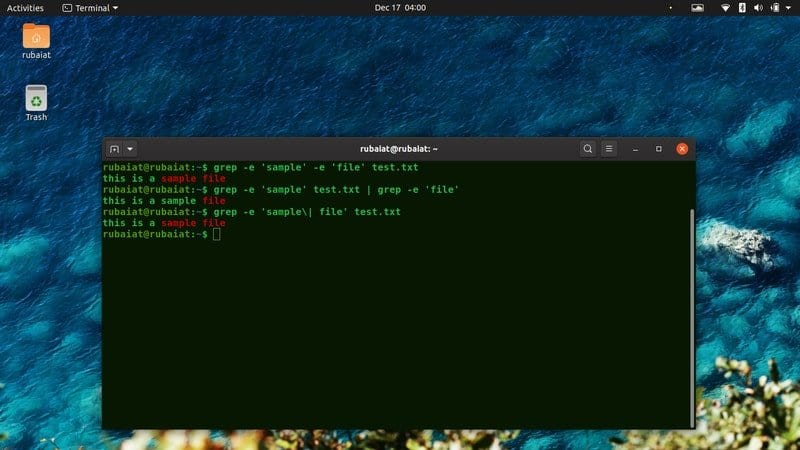

To turn on Regex in the Find Widget, click the. The following samples describe some regexp examples for commonly searched-for patterns. The second command produces four results because the Am in Amanda is also a match.
Grep regular expressions examples how to#
The first command produces three results with three matches highlighted. The following example demonstrates how to run grep using a case-insensitive regular expression, matching either uppercase or lowercase instances of characters. sub and gsub perform replacement of the first and all matches respectively. To do so, we type the following: grep -E 'am' geeks.txt. grep, grepl, regexpr, gregexpr and regexec search for matches to argument pattern within each element of a character vector: they differ in the format of and amount of detail in the results. +? (no parentheses), but putting in the parentheses (.+?) allows us to refer to the sub-match in between them as $1 in the replace step. An easy way around this is to use the -i (ignore case) option with grep.

no-index Search files in the current directory that is not managed by Git.

The above command will print lines matching all the patterns at once. regex - Grep regular expression for digits in character string of variable length - Stack Overflow I need some way to find words that contain any combination of characters and digits but exactly 4 digits only, and at least one character. So, for example, in this case we could find the relevant text with just. Here is the syntax using git grep combining multiple patterns using Boolean expressions: git grep -no-index -e pattern1 -and -e pattern2 -and -e pattern3. For example, suppose we want an expression. Grep will output the filenames and the line numbers or the actual lines that matched the regular expression. Back to top The wildcards are a start, but the idea could be taken further. It can search through files and folders (directories in UNIX) and check which lines in those files match a given regular expression. your search could be la la la (group1) blah blah (group2), using parentheses.Īnd then in the "Replace" step, you can refer to the capturing groups via $1, $2 etc. Tutorial What Is grep Grep is a tool that originated from the UNIX world during the 1970’s. In the "Find" step, you can use regex with "capturing groups," e.g. Getting started with grep Context line control Difference between grep, egrep, fgrep, pgrep. matches almost any character h.o matches hoo, h2o, h/o, etc. To find and modify text (not completely replace), REGEX Cheat Sheet GREP cheat sheet characters what to seek ring matches ring, springboard, ringtone, etc. On Linux, yes - or where GNU grep is used. See: Regular Expressions and grep for POSIX-standard details. Mercifully, you only need dash, hence the notation chosen. This gets cut to parse the line into fields by splitting on the delimiter _, and returns just field 2 (field numbers start at 1)).For beginners, I wanted to add to the accepted answer, because a couple of subtleties were unclear to me: If you need a close square bracket too, then you need the close square bracket followed by the dash. If you're using Bash, you don't even have to use grep: files="*.jpg"įor f in $files # unquoted in order to allow the glob to expand


 0 kommentar(er)
0 kommentar(er)
